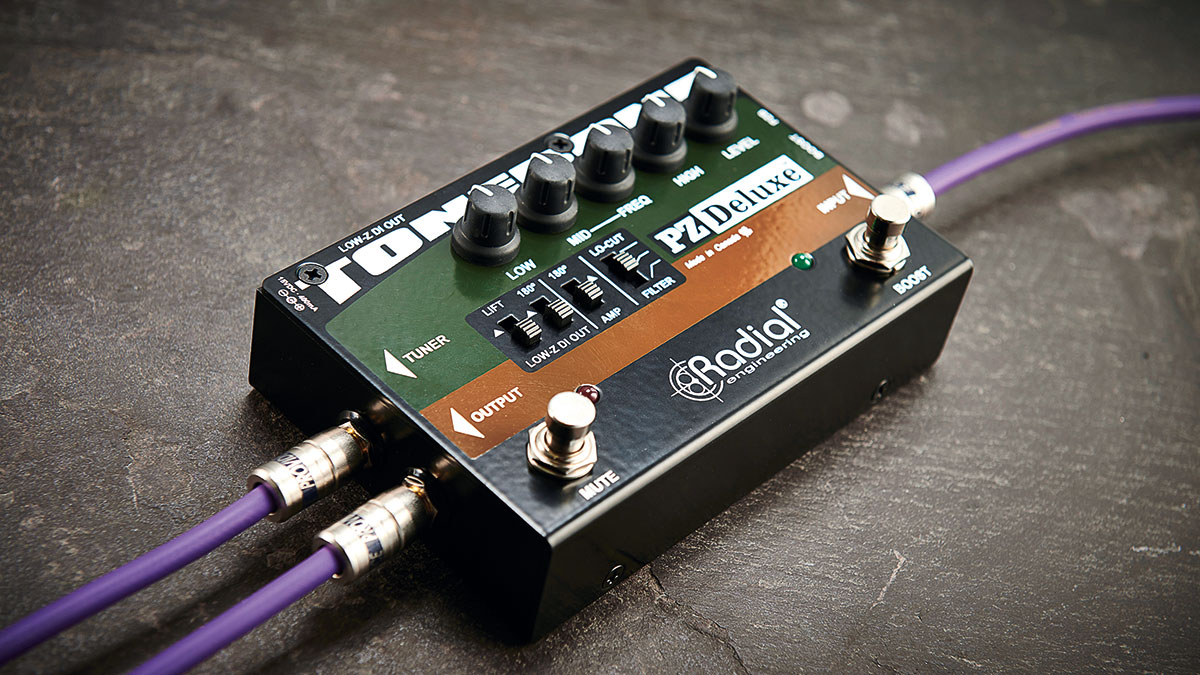MusicRadar Verdict
It's not cheap, but neither does it feel or sound it. An eminent road hog!
Pros
- +
Does what it says on the tin...and does it well.
Cons
- -
Lacks bells and whistles.
MusicRadar's got your back
Radial's Tonebone range is extensive and includes the long-running PZ-Pre, pretty much the most feature-laden dual-input acoustic guitar/instrument preamp we've encountered.
But while the PZ-Pre (£271) might be too feature-laden for many, the PZ-Deluxe strips it down to a more focused, single-input design, all housed in a smaller but weighty, bomb-proof rugged metal enclosure (145mm wide by 95mm deep and approximately 45mm tall) that won't take up too much space.
Think of the PZ-Deluxe as your control centre with input-conditioning features, tone shaping via three-band EQ with semi-parametric midrange, and jack outs for your stage amp, tuner and an XLR to take your signal to the PA.
Add in a mute switch for silent plugging in and unplugging of your guitars, plus a set-and-forget level boost with 13dB of gain, and you have pretty much all you need.
Input is a single jack. There's no LED input indicator and you can use the PBZ gain stage if you're using a passive piezo pickup via a simple side-mounted push switch. The boost level is a recessed control that you can set with a cross-head screwdriver, which won't get moved in transit.
Output level is controlled for both the XLR and jack amp outputs via the right-hand rotary control. To the left of that are four other rubbed-knobbed controls, which feel extremely tough, for low, mid, mid frequency and high.
In the centre of the preamp are four slide switches: ground lift; separate 180-degree phase inversion for both the DI and amp outputs; and, finally, a three-position Lo-Cut filter with flat, low-mid cut and low-cut positions.
Want all the hottest music and gear news, reviews, deals, features and more, direct to your inbox? Sign up here.
Sounds
Powered by an included 15-volt (400mA) external power supply, the PZ-Deluxe is one of those 'it does what it says on the tin' products.
Using a variety of low-to-high-end steel-and nylon-string guitars, we easily dialled in pretty much all we needed. As ever, you'll need to take care with setting levels to minimise any additional background hiss.
The mid-frequency range is very wide, so you might, for example, want to cut a more general midrange from your guitar's onboard preamp and use the PZ-Deluxe's midrange to dial out those trickier, more specific upper-mid or lower-mid points - quite often, two midrange cuts are needed, with the low end and high end more of a general character.
Nope, this is the sort of signal conditioning that should ensure your out-front and backline sound is maximised.
Think of this as a DI box with EQ - and one that you'll know, rather than whatever the venue has to offer (and they can be of highly varying quality!) - and you'll make friends with any sound person out there.
More expensive preamps like LR Baggs' Venue DI adds a second midrange band, plus a stage-friendly tuner, while Fishman's Platinum Pro is configured to work with guitar or bass, has compression and a highly visible tuner.
But if you don't need those bells and whistles, or you already have them, this will sit quite happily as a standalone unit or the 'brain' of an extensive acoustic pedalboard.
Dave Burrluck is one of the world’s most experienced guitar journalists, who started writing back in the '80s for International Musician and Recording World, co-founded The Guitar Magazine and has been the Gear Reviews Editor of Guitarist magazine for the past two decades. Along the way, Dave has been the sole author of The PRS Guitar Book and The Player's Guide to Guitar Maintenance as well as contributing to numerous other books on the electric guitar. Dave is an active gigging and recording musician and still finds time to make, repair and mod guitars, not least for Guitarist’s The Mod Squad.

